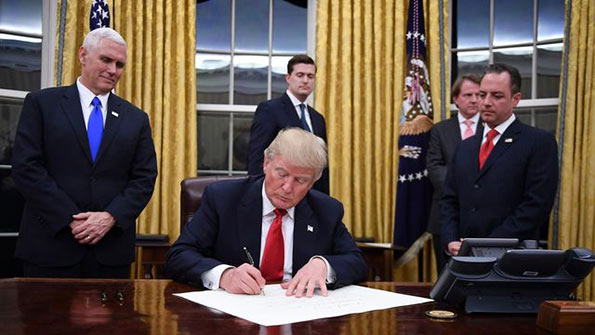Trump to ‘ban immigrants from Syria and 6 other countries

US President Donald Trump will begin rolling out executive actions on immigration Wednesday, beginning with steps to tighten border security – including his proposed wall along the US-Mexico border.
The president is also expected to take action over the next few days to temporarily ban immigration from Muslim countries deemed a ‘threat to national security’ – namely Syria, Iran, Iraq, Libya, Yemen, Sudan, and Somalia.
In addition, Trump is set to sign other domestic immigration enforcement measures that will include targeting sanctuary cities that decline to prosecute undocumented aliens.
One key policy shift being discussed is whether to follow through on a campaign promise to scrap an Obama era initiative granting protection from deportation to hundreds of thousands of children of illegal immigrants.
The 2012 Deferred Action for Childhood Arrivals program (DACA) has shielded illegal immigrant children from deportation by granting them work permits, but Trump vowed during the campaign to end the initiative.
‘Many options are being worked through on DACA,’ a White House official told The Washington Post.
The Donald will get started with an executive order authorizing the wall on Wednesday, while the immigration bans are still being finalized and could come later in the week.
The president posted a tweet on Tuesday evening signaling that major announcements were in the offing.
‘Big day planned on NATIONAL SECURITY tomorrow,’ Trump tweeted. ‘Among many other things, we will build the wall!’
The new Trump directives will also stop most refugees including those from Syria coming to America while vetting processes are reviewed.
The one exception is religious minorities fleeing persecution – which would apply to Christians fleeing Syria and other Muslim majority countries, according to several congressional aides and immigration experts briefed on the matter.
In total over the next few days, Trump is expected to:
- Direct federal funds toward the construction of a wall along the southern border
- Target so-called ‘sanctuary’ cities that decline to prosecute undocumented aliens
Measures still being finalized and subject to change include:
- A four-month freeze on admission of all refugees
- Grant exceptions to Christians and other minorities fleeing Muslim persecution
- Halt visas to people from Syria, Iraq, Iran, Libya, Somalia, Sudan, and Yemen because the Muslim-majority countries that are ‘terror prone’
- The visa bans would last at least 30 days while vetting processes are reviewed
- Stop protecting illegal immigrants who arrived in the US as children from deportation
The proposed plans include at least a four-month halt on all refugee admissions, as well as temporary ban on people coming from some Muslim majority countries, according to a representative of a public policy organization that monitors refugee issues.
There is also likely to be an exception in the refugee stoppage for those fleeing religious persecution if their religion is a minority in their country.
That exception could cover Christians fleeing Muslim-majority nations.
The Republican president was expected to sign the orders at the Washington headquarters of the Department of Homeland Security, whose responsibilities include immigration and border security.
On the campaign trail, Trump initially proposed a temporary ban on Muslims entering the United States to protect Americans from jihadist attacks.
Both Trump and his nominee for attorney general, U.S. Senator Jeff Sessions, have since said they would focus the restrictions on countries whose migrants could pose a threat, rather than placing a ban on people who follow a specific religion.
Many Trump supporters decried Democratic President Barack Obama’s decision to increase the number of Syrian refugees admitted to the United States over fears that those fleeing the country’s civil war would carry out attacks.
Detractors could launch legal challenges to the moves if all the countries subject to the ban are Muslim-majority nations, said immigration expert Hiroshi Motomura at UCLA School of Law. Legal arguments could claim the executive orders discriminate against a particular religion, which would be unconstitutional, he said.
“His comments during the campaign and a number of people on his team focused very much on religion as the target,” Motomura said.
Stephen Legomsky, who was chief counsel at U.S. Citizenship and Immigration Services in the Obama administration, said the president had the authority to limit refugee admissions and the issuance of visas to specific countries if the administration determined it was in the public’s interest.
‘From a legal standpoint, it would be exactly within his legal rights,’ said Legomsky, a professor at Washington University School of Law in St. Louis. ‘But from a policy standpoint, it would be terrible idea because there is such an urgent humanitarian need right now for refugees.’
To block entry from the designated countries, Trump is likely to instruct the US State Department to stop issuing visas to people from those nations, according to sources familiar with the visa process.
(Source: Daily Mail)

Latest Headlines in Sri Lanka
- Sri Lanka’s Public Finance Committee approves excise duty hike on liquor March 8, 2025
- President Dissanayake holds talks with IMF chief on Sri Lanka’s economic progress March 8, 2025
- Stalin urges India to secure release of Tamil Nadu fishermen from Sri Lanka March 8, 2025
- President highlights women’s role in shaping Sri Lanka’s political future March 8, 2025
- PM Harini on Women’s Day 2025: “No woman is safe until every woman is safe” March 8, 2025


